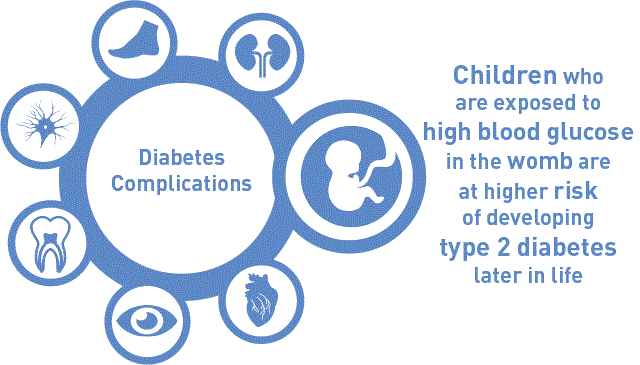Gestational diabetes develops in women during pregnancy because the mother’s body is not able to produce enough insulin. Insulin is a hormone that enables the body to break down sugar (glucose) to be used as energy. Without sufficient insulin, the amount of sugar in the blood rises. High blood sugar levels in the mother’s body are passed through the placenta to the developing baby. This can cause health problems.
Gestational diabetes usually begins in the second half of pregnancy and goes away after the baby is born. This makes it different to the more common forms of diabetes which, once they occur, are permanent.
What causes gestational diabetes?
The hormones produced during pregnancy work against the action of insulin. Gestational diabetes can happen if the mother’s body can’t produce enough extra insulin to counteract this blocking effect.
Who is more likely to get gestational diabetes?
Women are more at risk if they:
• have a family history of type 2 diabetes
• are over the age of 35
• are obese
• have previously given birth to a large baby
• have previously given birth to a baby born with an abnormality
• have previously had a stillbirth late in pregnancy
How would I know if I had gestational diabetes and how is it diagnosed?
The symptoms of gestational diabetes are tiredness and excessive urination. Both of these symptoms are experienced by most pregnant ladies and therefore gestational diabetes may go unnoticed. It is normal to be tested for gestational diabetes in the latter part of the second trimester of pregnancy (24 to 28 weeks). Urine is routinely tested for sugar throughout pregnancy, and high blood sugar, if present, is usually detected between 24 and 28 weeks of pregnancy. The only way to confirm gestational diabetes is with a glucose tolerance test, which needs to be carried out after eight hours without food. The woman is given a solution of glucose to drink, and then blood samples are taken and analysed at different intervals to see how the body deals with the glucose over time.
What is the treatment of gestational diabetes?
The most important part of treatment is to control blood sugar levels. For many women, this means regular testing of blood sugar (glucose) levels, a carefully planned diet and regular exercise. Some women will require insulin injections. The extra insulin will not cross the placenta and will not affect the baby. Many women with gestational diabetes will need to make dietary changes to help manage their blood glucose levels. Your diabetes nurse/midwife or dietitian will guide you with this.
Does gestational diabetes go away?
Gestational diabetes usually goes away after pregnancy. But once you’ve had gestational diabetes, your chances are 2 in 3 that it will return in future pregnancies. In some women, however, pregnancy uncovers type 1 or type 2 diabetes. It is difficult to ascertain whether they are having gestational diabetes or are showing their diabetes during pregnancy.
Many women who have gestational diabetes go on to develop type 2 diabetes in the later years. There seems to be a relation between the tendency to have gestational diabetes and type 2 diabetes. Both conditions involve insulin resistance. If you have had gestational diabetes you should have a blood test to check for Diabetes six weeks after your baby is born and every year thereafter to ensure you have not developed Type 2 Diabetes. Talk to your hospital team or to your GP to find out more about these blood tests.
Follow-up after pregnancy with gestational diabetes
Gestational diabetes affects approximately 7000 pregnancies in Ireland each year. Roughly half of those affected will develop type 2 diabetes in the future. It is possible to reduce this future risk of diabetes by up to 50%. Here’s how:
- Breastfeeding
Breastfeeding can reduce the risk of developing type 2 diabetes, possibly by helping the body process glucose and insulin better. Breastfeeding for longer than 3 months can reduce the risk of future type 2 diabetes by almost half in women/people who have had gestational diabetes. General information on breastfeeding including tips and techniques, groups and supports, and common challenges can be found here https://www2.hse.ie/babies-children/breastfeeding/
- Eating healthily
A balanced diet that includes a mixture of vegetables, salads and fruit, whole grains, fish, foods rich in fibre and foods that contain healthy (monosaturated) fats, is linked to a lower risk of future type 2 diabetes. Information about eating well for health can be found here How to eat well – HSE.ie and here Healthy eating for families – HSE.ie. Meal plans and recipe ideas can be found here https://www.safefood.net/healthy-eating .
- Body weight
Weight gain is a known risk factor for type 2 diabetes. Women/people with gestational diabetes who are overweight, and who remain overweight after a baby is born have the highest risk of developing type 2 diabetes. A healthy body weight can reduce the risk of future type 2 diabetes. However, weight loss is not always easy, and professional advice can help in finding available support. Talk to your GP nurse or dietitian about the weight management approach that is right for you. Some supports you may find helpful can be accessed here Managing your weight – HSE.ie
- Being active
Aim for a minimum of 150 minutes of moderate-intensity exercise each week (that’s 30+ minutes on 5 days), or 75+ minutes of more vigorous activity (or a combination of both) over a week. Brisk walking, aqua aerobics and gardening are examples of moderate-intensity exercise. Vigorous activity includes swimming laps, running, and cycling 10 miles an hour or faster. Strength training such as pilates, resistance exercise or weight training can further reduce the risk of type 2 diabetes.
Don’t worry if you are less active now. Small increases in activity are a great start. To start with try breaking the activity up into smaller amounts of five to ten minutes at a time and extend these as you can.
The HSE has ideas for increasing physical activity Getting active for your lifestyle – HSE.ie
Your local sports partnership has information about organised group activities in your area https://www.sportireland.ie/participation/lsp-contact-finder .
- Monitoring
Monitoring glucose levels during pregnancy with gestational diabetes is a key part of management. After pregnancy, how often monitoring should happen changes. Between 6-12 weeks after delivery, women/people who have had gestational diabetes should have an oral glucose tolerance test to check that the body is able to respond to glucose efficiently and to outrule preexisting diabetes. Ask your hospital team or GP about this test.
After pregnancy with gestational diabetes, every year it is advised to have a blood test with your GP as part of risk factor monitoring. For all women/people whose gestational diabetes occurred from January 2023 onwards, this test is free of charge under the Chronic Disease Management programme. Ask your GP or practice nurse for more information.
Most women with diabetes have a normal pregnancy resulting in a healthy baby. However, having diabetes does increase the chances of complications for both mother and baby.
Planning and preparing for a pregnancy with your diabetes team can substantially reduce that risk.
Resources
Professor Fidelma Dunne and her team explain the risks involved with diabetes in pregnancy and how to reduce these risks to ensure the best possible outcome for both mother and baby with type 1, type 2 and gestational diabetes.
See www.whatsupmum.ie/diabetes for invaluable information and videos on pregnancy and diabetes.
Download our booklet on Gestational Diabetes
To read Yvonne Moloney’s, a Registered Advanced Midwife Practitioner (RAMP) Diabetes with the University of Limerick Hospitals Group, featured a piece on Gestational Diabetes in our 2022 members magazine, click here.
Overweight and obesity, diabetes in an immediate family member and older age are all risk factors for developing diabetes during pregnancy, writes Yvonne. Read the full article
Updated January 2024



